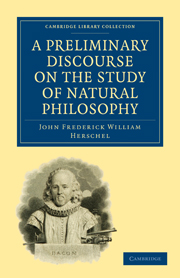Book contents
- Frontmatter
- Contents
- Dedication
- PART I OF THE GENERAL NATURE AND ADVANTAGES OF THE STUDY OF THE PHYSICAL SCIENCES
- PART II OF THE PRINCIPLES ON WHICH PHYSICAL SCIENCE RELIES FOR ITS SUCCESSFUL PROSECUTION, AND THE RULES BY WHICH A SYSTEMATIC EXAMINATION OF NATURE SHOULD BE CONDUCTED, WITH ILLUSTRATIONS OF THEIR INFLUENCE AS EXEMPLIFIED IN THE HISTORY OF ITS PROGRESS
- CHAP. I Of Experience as the Source of our Knowledge. — Of the Dismissal of Prejudices. — Of the Evidence of our Senses
- CHAP. II Of the Analysis of Phenomena
- CHAP. III Of the State of Physical Science in General, previous to the Age of Galileo and Bacon
- CHAP. IV Of the Observation of Facts and the Collection of Instances
- CHAP. V Of the Classification of Natural Objects and Phenomena, and of Nomenclature
- CHAP. VI Of the First Stage of Induction. — The Discovery of Proximate Causes, and Laws of the lowest Degree of Generality, and their Verification
- CHAP. VII Of the higher Degrees of Inductive Generalization, and of the Formation and Verification of Theories
- PART III OF THE SUBDIVISION OF PHYSICS INTO DISTINCT BRANCHES, AND THEIR MUTUAL RELATIONS
- Index
CHAP. IV - Of the Observation of Facts and the Collection of Instances
Published online by Cambridge University Press: 29 August 2010
- Frontmatter
- Contents
- Dedication
- PART I OF THE GENERAL NATURE AND ADVANTAGES OF THE STUDY OF THE PHYSICAL SCIENCES
- PART II OF THE PRINCIPLES ON WHICH PHYSICAL SCIENCE RELIES FOR ITS SUCCESSFUL PROSECUTION, AND THE RULES BY WHICH A SYSTEMATIC EXAMINATION OF NATURE SHOULD BE CONDUCTED, WITH ILLUSTRATIONS OF THEIR INFLUENCE AS EXEMPLIFIED IN THE HISTORY OF ITS PROGRESS
- CHAP. I Of Experience as the Source of our Knowledge. — Of the Dismissal of Prejudices. — Of the Evidence of our Senses
- CHAP. II Of the Analysis of Phenomena
- CHAP. III Of the State of Physical Science in General, previous to the Age of Galileo and Bacon
- CHAP. IV Of the Observation of Facts and the Collection of Instances
- CHAP. V Of the Classification of Natural Objects and Phenomena, and of Nomenclature
- CHAP. VI Of the First Stage of Induction. — The Discovery of Proximate Causes, and Laws of the lowest Degree of Generality, and their Verification
- CHAP. VII Of the higher Degrees of Inductive Generalization, and of the Formation and Verification of Theories
- PART III OF THE SUBDIVISION OF PHYSICS INTO DISTINCT BRANCHES, AND THEIR MUTUAL RELATIONS
- Index
Summary
(109.) Nature offers us two sorts of subjects of contemplation in the external world, — objects, and their mutual actions. But, after what has been said on the subject of sensation, the reader will be at no loss to perceive that we know nothing of the objects themselves which compose the universe, except through the medium of the impressions they excite in us, which impressions are the results of certain actions and processes in which sensible objects and the material parts of ourselves are directly concerned. Thus, our observation of external nature is limited to the mutual action of material objects on one another; and to facts, that is, the associations of phenomena or appearances. We gain no information by perceiving merely that an object is black; but if we also perceive it to be fluid, we at least acquire the knowledge that blackness is not incompatible with fluidity, and have thus made a step, however trifling, to a knowledge of the more intimate nature of these two qualities. Whenever, therefore, we would either analyse a phenomenon into simpler ones, or ascertain what is the course or law of nature under any proposed general contingency, the first step is to accumulate a sufficient quantity of well ascertained facts, or recorded instances, bearing on the point in question. Common sense dictates this, as affording us the means of examining the same subject in several points of view; and it would also dictate, that the more different these collected facts are in all other circumstances but that which forms the subject of enquiry, the better; because they are then in some sort brought into contrast with one another in their points of disagreement, and thus tend to render those in which they agree more prominent and striking.
- Type
- Chapter
- Information
- A Preliminary Discourse on the Study of Natural Philosophy , pp. 118 - 134Publisher: Cambridge University PressPrint publication year: 2009First published in: 1830

